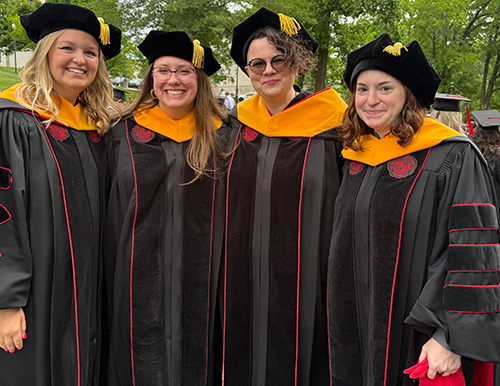WKU News
WKU PsyD Program in Clinical Psychology Earns APA Accreditation for New Programs
- Tuesday, November 18th, 2025

Western Kentucky University’s Doctor of Psychology (PsyD) program in Clinical Psychology has been granted initial accreditation status by the American Psychological Association’s Commission on Accreditation (APA-CoA), effective November 8, 2024. This milestone affirms the program’s quality and its commitment to preparing future psychologists to address critical mental health needs in Kentucky and beyond.
With this decision, WKU’s PsyD program is now included among APA-accredited programs nationwide. This is an essential credential for students seeking licensure, clinical placements, and competitive career opportunities in health service psychology.
Dr. Robert Welsh, director of the PsyD program and Professor of Psychology, emphasized the significance of the achievement, saying “To receive accreditation from the American Psychological Association indicates that the program has met the highest standards of quality.”
The program was started in 2014 to address workforce needs, as Dr. Welsh explains, “The program was created by Dr. Rick Grieve as a response to meet the significant mental health needs of Western Kentucky. The PsyD program is a comprehensive training program for providers of mental health services. Of all mental health professionals, psychologists receive the most extensive training in psychotherapy, psychological assessment, diagnosis, and supervision of other mental health professionals. Clinical psychologists often go on to take leadership and supervisory roles in mental health agencies.”
In its decision, the APA-CoA recognized WKU’s strong alignment with the Standards of Accreditation for Health Service Psychology, noting:
- A curriculum that supports high-quality clinical training
- Qualified and effective faculty and program leadership
- Clear communication of the program’s goals, expectations, and ethical foundations
- Revisions that strengthen student understanding of APA Ethical Principles
By offering rigorous clinical training rooted in the Vail model (scholar-practitioner), the program prepares students for direct clinical practice in underserved communities. Attaining this accreditation is vital for graduates’ careers. Students who graduate from an APA-accredited program can become licensed in any state and can work in a large variety of settings including medical centers, prisons, Veteran's Administration hospitals and clinics, law enforcement agencies, community mental health centers, and many other service settings.
Students in the program dedicate significant time to training and community service, according to Dr. Welsh. “Students pursue PsyD training programs with APA accreditation and will spend five to six years at the university. During their training, students provide supervised mental health services to the local community and work in agencies, hospitals, and community mental health centers. During their training, each student will provide over 1000 hours of service to members of the local community. Establishing APA accredited psychology programs is an effective and efficient way to meet the mental health needs of the areas surrounding Warren County.”
While the PsyD is a doctoral degree, it differs from a PhD in its focus. Dr. Welsh explains, “The difference between a PsyD and a PhD is focused exclusively on training practitioners, and not researchers. The PsyD still requires research training, but most of the coursework and practical training is focused on delivering mental health services.”
The accreditation comes at a pivotal time for behavioral health in the United States. Recent national projections highlight a widening gap between the demand for mental health services and the supply of licensed professionals:
- Nearly 23% of U.S. adults and over half of adolescents experienced mental health concerns in 2022, yet only half of those received treatment.
- The supply of psychologists is projected to drop from 115,270 in 2022 to 94,890 by 2037, while demand is expected to climb to 174,050, meeting only 54.5% of national need.
- Shortages are especially severe in the South and Midwest, where adequacy rates are expected to fall as low as 34% by 2037.
Dr. Welsh explains, WKU is uniquely positioned to help alleviate this crisis in Kentucky. “WKU is now the only APA-accredited doctoral psychology program in the western half of the state. There are currently fewer than 100 fully trained and licensed doctoral level psychologists in this half of the state. Our hope is that students will be drawn to the Bowling Green community to train for a profession and stay to provide services to the community in which they trained.”
WKU’s newly accredited status strengthens Kentucky’s capacity to train future licensed psychologists at a time of unprecedented need.
For more information, visit wku.edu/psychology/psyd.
Some of the links on this page may require additional software to view.

